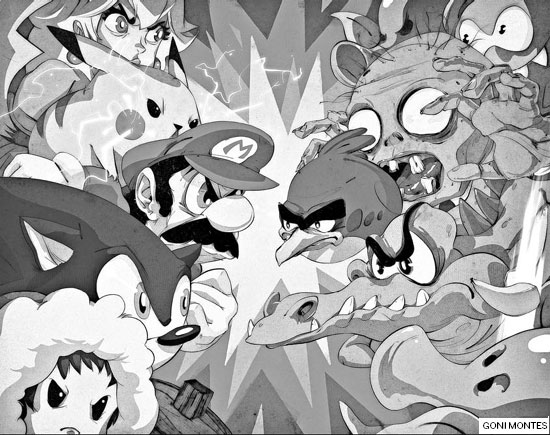Nintendo confronts changed gaming world
Updated: 2012-12-02 07:59
By Nick Wingfield(The New York Times)
|
|||||||

REDMOND, Washington - Tucked in the woods here is a little piece of the Mario Kingdom.
Behind the unassuming doors is the business built by Mario, the pudgy plumber, and Luigi, his lanky brother. They and other characters are the pixelated children of Shigeru Miyamoto, the Walt Disney of video games and creative genius of the Nintendo Company of Japan.
But while Mr. Miyamoto is dreaming his dreams across the Pacific, an army of marketing types is at work here in Redmond, inside the new headquarters of Nintendo of America. This palace of play is quiet, but there's trouble brewing in the world around it: three decades after the mustachioed Mario burst into arcades via Donkey Kong, the kingdom is under siege.
Nintendo's enemies have arrived by battalions. Angry Birds, Fruit Ninja and other inexpensive, downloadable games, particularly for cellphones and tablets, have invaded its turf. Changing tastes and technology have called into question the economics of traditional game consoles, whether from Nintendo or Microsoft, maker of the Xbox. Nintendo recently posted the first loss in its era as a video games company, a prospect that would have been unimaginable only a few years ago. And while game consoles aren't going away, analysts are skeptical that the business will regain its former stature soon.
All of which makes Nintendo's next move, and what is happening here, so crucial. Nintendo countered on November 18, when a new version of its Wii game console arrived in stores across the United States.
The original Wii was the first wireless, motion-capturing console. The simplicity of its controller, which Mr. Miyamoto helped design, attracted new audiences like women and older people. Then it simply faded. Now the Wii U may be Nintendo's last, best hope for regaining its former glory.
Initial demand appears high. GameStop, the video game retailer, sold out of almost all of its Wii Us, which start at $300, in the initial holiday shopping rush, according to Tony Bartel, GameStop's president. "I think people are starving for innovation, and Wii U is giving them that innovation," Mr. Bartel says.
Many industry veterans and game reviewers question whether the Wii U can be as successful as the original, now that many gamers have moved on to more abundant, cheaper and more convenient mobile games.
"I actually am baffled by it," Nolan K. Bushnell, the founder of Atari and the godfather of the games business, says of the Wii U. "I don't think it's going to be a big success."
The bigger question is what the future holds for any of the major game systems, including new ones that Sony and Microsoft are expected to release next year. Mr. Bushnell says that consoles are already delivering remarkable graphics and that few but the most hard-core players will be willing to pay hundreds of dollars for a new game box. "These things will continue to sputter along, but I really don't think they'll be of major import ever again," he says. Nintendo is unbowed. Mr. Miyamoto was involved in developing the original Wii, and had a role in the Wii U as well.
Nintendo has been in the business of fun since 1889. Its founder, Fusajiro Yamauchi, made playing cards. His great-grandson Hiroshi Yamauchi landed a licensing agreement with the Walt Disney Company and turned out Mickey Mouse playing cards. By the 1960s, Nintendo was pushing into other toys and games. Then, in 1975, Atari introduced a home version of Pong, the first hit video arcade game. Soon, Nintendo was chasing video games as the hot new thing, too.
But the history of games hardware is littered with spectacular flameouts, including Sega, 3DO and Mr. Bushnell's own Atari. Nintendo has endured through a combination of ingenuity and obsessive focus on both hardware and software.
Its gutsiest bet on the hardware side was the Wii, which came out at a time when it looked as if Nintendo was drifting to the margins. Nintendo couldn't afford to join in the arms race, led by its much bigger rivals Sony and Microsoft, to create systems with the most graphics horsepower. The Wii strategy led to a big comeback. Nintendo has shipped close to 100 million Wiis, while Sony and Microsoft have each shipped about 70 million of their latest consoles.
Nintendo does not create games for devices made by other companies, including the hundreds of millions of iPod Touches, smartphones and tablets out there. Industry executives say this represents a missed opportunity, allowing a new generation of game brands, like Angry Birds, to emerge unchallenged on mobile devices, much as Disney did in another realm years ago by allowing Pixar to own computer animation.
"It's the hardest strategic decision Nintendo has had to face in a long time," says Robbie Bach, the former head of Microsoft's Xbox business.
Cellphones and tablets have given people a nearly bottomless supply of games that typically cost a few dollars at most. Web and Facebook games are usually free. Industry veterans argue that you get what you pay for: mobile and Facebook games that are shallow entertainment experiences.
Mobile games have hurt sales of dedicated portable game devices from Nintendo and Sony, but the threat does not stop there.
It's likely that Nintendo will eventually face a more direct challenge from the same companies that have reshaped the mobile games business. Amazon, Apple and Google are all strong contenders to be in that camp, given their innovation track records.
But Mr. Bach, the Microsoft ex-executive, says he doesn't underestimate the company. "I've learned not to count the Nintendo guys out," he says.
The New York Times
(China Daily 12/02/2012 page10)